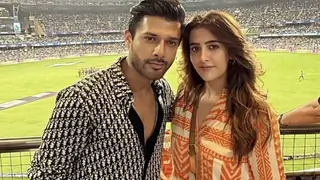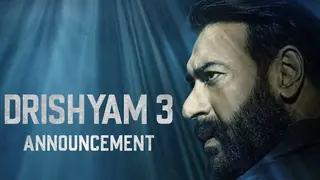Folks,
Here I am again, scraping past the finishing line just in time!😉 There have been assorted pujas in our building, and I still have to attend the last one.
This episode was bookended between 2 scenes, both of Taruni and her father, but how very different they were one from the other! Together, they sketched the graph of the father-daughter relationship, which had dipped for a while but was, by episode end, climbing to new highs. The rest, even Yudh's magisterial and moving speech to the workers, was like the filling of a sandwich, tasty and essential, but held together by the framework of these two seminal scenes.
Taruni-Yudh 1: The first, of a Taruni who is disturbed by her finding the missing medical report on Yudh's table, was remarkable for the restraint, maturity and honesty with which it was scripted and enacted. One has to admire what was not there: no shouting or loud accusations, no tears, no reproaches from Taruni's side, and no tenacious, insistent explanations or angry denials from Yudh's.
She is upfront in stating what troubles her - the confusion as to whom to trust in the face of this fact, and her fervent desire that the image that she has had of her father from her early years should not be soiled or damaged. She has, over the last few days that she has been with him, seen his decisions , even those taken in very difficult situations, be sharp, smart and correct, and above all unclouded by emotion. So perhaps she is afraid that he might have made another such hard decision to eliminate Dr. Mehra.
While she tells Yudh that she does not want him to offer her any explanations, the truth is that she wants above all for there to be a valid and convincing explanation that would clear her father of any shadow of a doubt. She does not want her hero to have feet of clay.
But no such relief is forthcoming. Nor does Yudh - who, first shell shocked into a long moment of dead silence, then protests and says that he would find out how the report got on to his desk - make any further move to hold Taruni back.
I loved it that he treated her not as a daughter who owed him implicit faith and loyalty, but as an adult equal, who was entitled to her own views and her own doubts, even if those doubts were about her father.
But after she has left, and the camera zooms in on Yudh, front face and from the back, he looks dead tired, and worn out emotionally. It is said that the back is the most eloquent of a person's state of mind, and in this closing shot, Yudh's back is more eloquent than most.
Taruni-Yudh 2: The mood here is the total opposite of that in the first one. When Taruni comes in and looks down at the recumbent Yudh, eyes closed and fatigue etched in every line of his body, her eyes almost brim over with regret and sadness. Yes, and guilt too, for having burdened this already overburdened man with her loss of faith in him.
When he opens his eyes and sees her seated next to him, his first query is about the injured workers, and the next sentence is to say that he wishes he could thank for all that she had done and was doing for them. He does not even touch on the really sticky issue between them, her harsh assessment of his character.
It is no wonder that Taruni's face and eyes are tense and guilty as she apologises, and she does this frankly and with no circumlocutions or excuses. That is the way she is, upfront and open, both for good and for bad. Thus, it is admirable that even when she has such serious doubts about her father, she still does not fail to inform him about the death of the injured worker Mohan at the hospital, for she scents trouble ahead and does not want him to be taken by surprise.
It is equally characteristic of Yudh that he brushes aside her apology as uncalled for. And when she asks, her voice harsh with worry and fear Aapko marna kaun chahta hai? , the long, level look that Yudh gives her is a marvel of nuance. His gaze is at first ever so slightly startled, then questioning - How much can I tell her? - and then assessing - How much can she take?
He decides that she can indeed take it, and he comes clean with her about both his usual dushman, the ones he knows, and this new one, far more chalak, who wants to kill him and if whom he knows nothing.
All the fear and anguish that are choking Taruni's throat then come bubbling out in that one question: Aap aise kaise jeete hain? The difference between her secure, uncomplicated existence and his troubled, at times besieged, existence, right now under murderous threat from a shadowy, very astute unknown, was never more starkly expressed.
When he talks of his responsibility for the livelihoods of his 10000+ employees, to fulfil which he has to live, when he assures her that he can tackle his enemies, and confesses that it is this disease that has defeated him, Taruni's face melts in empathy and caring and a desperate desire to save him and to lighten his daily burdens. As she promises that she will do everything she can to help him cope with his disease, Yudh's face lights up with pride and affection in his daughter. It was wonderful to behold.
Then comes the clash of wills over the phone between the Minister, convinced that Yudh is deliberately flouting the verbal agreement reached in person between them a day earlier, and a Yudh who tries hard to avoid a falling out with this powerful man. Taruni is a witness who hears only one side, Yudh's , and has to imagine the rest.
Her face is tense as Yudh is trying to ward the threatening caller off, assuring him that there is no question of his being against the Minister, and that he would make sure his interests would be taken care of by ensuring that the output from the mine was not reduced in any way. She is clearly on edge, afraid that there is more trouble on the way for her already embattled dad.
Yudh then faces down the Minister, who insists that it has to be his way or the highway, and that Yudh can quit if he will not toe the line : Maine khatra to mol liya hai.. bahut der ho chuki hai.. main kahin nahin jaane wala.. Yeh khel aapko ab meri tarah hi khelna hoga..
This too is vintage Amitabh Bachchan, merely remixed to suit his present age, but the rock hard defiance of the bad guys is exactly the same as in his Zanjeer and Deewaar days.
It is significant that as she listens, the unshakably principled Taruni does not look proud and relieved that her father is a man of such courage, compassion and integrity. On the contrary, it is worry that dominates in her eyes, for anything that goes wrong with this man, whom she not only admires but now also loves, will affect her as much as it does him.
The poet says, rightly, that He who hath a child has given a hostage to fortune. One could, looking at Taruni, say with equal truth She who hath a parent has given a hostage to fortune.
Moral certitudes: We need no longer have even the faintest of doubts as to Yudh's integrity and humanity. Both are rock steady. He is no ruthless industrialist out to make the quickest and biggest profit out of the mines, and the risks to the workers be damned, for workers are, by definition, in the Minister's contemptuous reference to security measures for them, dispensable and of no account.
For Yudh sees them not just as human beings, but as his partners in this new venture of his, who need to be cared for and provided for. While he does not protest too much when the Minister descends on him and insists that he replace the striking workers with outside recruits and restart the mining operations, when the time comes, he nixes this arrangement.
Yudh's address to the angry and belligerent workers, who have been manipulated by the wily Gopal into agreeing to join the AILF and its violent ways, is a masterpiece of eloquent persuasion, backed up by open-handed generosity and heartfelt assurances of solidarity. He never raises his voice, never waves his arms in exaggerated gestures, never utters any threats. Instead, he appeals to their sense of kinship with their dead comrade, stresses that they are all members of one large family with shared interests, and invites them to usher in a new dawn with him, as partners whose views would have a role in shaping their future course of action. It was a wonderful script, and it was even more wonderfully delivered by Amitabh Bachchan.
As the reassuring words roll out in the familiar, deep baritone, one can literally see the hostility melt away from the faces in the crowd, to be replaced by a dawning trust and a budding sense of belonging. The tide has turned. Proof positive of this is the sight of Gopal and his two cohorts sneaking away thru the now attentive and peaceful crowd of workers, like defeated soldiers running away from the battlefield.
But what was the most impressive of all was Yudh's unhesitating response to the policeman who asks him if he can indeed pull off all that he has promised: Jab tak khud ko challenge nahin kiya jai, roz roz naye naye aur mushkil targets na set kiye jain, game ko change karna bahut mushkil ho jaata hai..
This is Yudh's philosophy of life in a nutshell. He has been pushing the envelope all his life, and he has not stopped doing so. He will always choose the path less travelled, the more difficult one, and he will push himself beyond his normal capacities to get where he wants to get. And those who would walk with him on his chosen path have to be prepared to face whatever comes. And in the precap, it seems to be coming with fiery flames.
Anand: Unshakable loyalty: Yudh is indeed blessed in the admirable lieutenant that he has in Anand, and nothing will make me believe that Anand would in any way betray Yudh's unquestioning trust in him.
Anand's handling of the disturbed Taruni, insistent on returning home at once, is masterly. He does not contradict her or pooh pooh her doubts, but instead readily concedes their validity. He then asks her to stay on for just 2 days more, and bingo, within those 2 days, he has pinned down the truth and dispelled all her doubts and fears.
The way in which he carries out the investigation, with both logic and intuition to guide him, and pieces the truth together bit by bit, as in a jigsaw puzzle, is remarkable. Sherlock Holmes would have applauded.
And as Anand puts the whole picture together, the shadowy MM acquires an even more sinister hue, that of an obsessed and vengeful killer, dead set on murdering Yudh one way or the other, not just on destroying him professionally. But why this almost demented hatred of Yudh? Do its roots lie in a shared past?
Mona: Folly unlimited: I would hand her a couple of more black marks for sheer incompetence of the kind that could cause much damage to the Shanti Group of Industries.
Agreed that Kapil took her by surprise and the loss of her laptop and mobile was not really her fault. But what has she, or Anand for that matter, done during the day after Kapil collared both these items to try and get them back by using strong arm methods? Precisely nothing. Mona to Mona, I was dismayed that even Anand did not enquire about the laptop and mobile even once while he was investigating the VX and Mehra accident affairs.
So Kapil has been able to sell the laptop to Dharmendra Malik in return for Malik quashing the teen abuse case against Kapil once and for all. And the one to bear the brunt of this exchange is going to be 18 year old Smriti. The poor girl was thanking Mona profusely for having given her sound advice not to go to the police about Kapil having exploited her. Little does she know what far worse things lie ahead, due largely to Mona's folly.
Gautam: Objective advice?: I am not at all sure of either the soundness or the advisability of the advice his mentor gives Yudh, primarily on how to handle the bullying Home Minister. By telling him that he should make it clear who is the ringmaster, he seems to be instigating Yudh to take an overtly tough line with the Minster. Now there are ways of saying and explaining things to another person without putting his back up, but that is not what Gautam advises or what Yudh eventually adopts when he openly defies the Minister. It remains to be seen who was right and to what extent.
Shyamala B.Cowsik



































